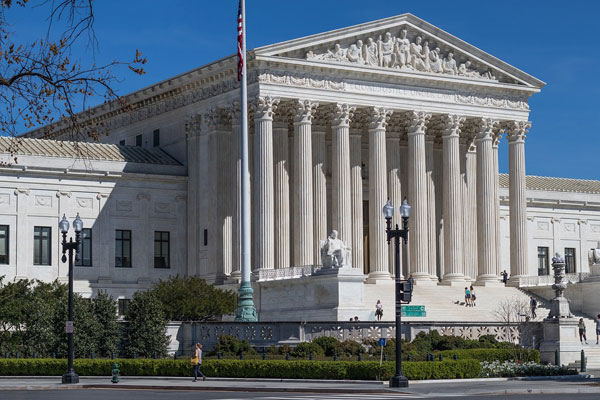The Supreme Court ends affirmative action

[Supreme Court, credit to Pixabay]
On June 29, 2023, the Supreme Court Justices ruled the consideration of race in college admissions to be unconstitutional.
This decision marks a significant turning point in the history of affirmative action in the United States, effectively ending race-conscious admission programs at colleges and universities nationwide.
Affirmative action is a policy aimed at promoting diversity and equal opportunity with a long and complex history in the United States.
It emerged during the civil rights movement in the 1960s, striving to address historical disadvantages faced by minority groups in education and employment.
The term ‘affirmative action’ was originated by former President Kennedy in executive order (E.O.) 10925 that sought to prevent race discrimination in 1961.
In June 1965, former President Johnson extended the order to apply to any organization that receives federal money.
However, affirmative action was faced with immediate pushbacks.
In 1977, Allan Bakke applied to attend medical school in the University of California system.
When he was denied admission, he sued the University of California claiming that stricter standards had been applied to African American admits.
He also pointed out the 16 seats set aside for students of color.
A year later, the U.S. Supreme Court upheld the use of race as one factor in choosing qualified applicants for admission.
At the same time, it also ruled unlawful the University Medical School's practice of reserving seats each entering class for disadvantaged minority students.
The current case originated from accusations against Harvard University, the oldest private university in the U.S., and University of North Carolina, the oldest public institution, for imposing a penalty on Asian-Americans and giving preferences to other racial minorities.
In a 6-3 decision against UNC and 6-2 against Harvard, the court ruled that both programs at UNC and Harvard violated the Equal Protection Clause of the Constitution and thus were ruled unconstitutional.
For both cases, the court’s six conservative justices, which include Justice Roberts, Thomas, alito, Gorsuch, Kavanaugh, and Barrett formed the majority in ruling affirmative action unconstitutional.
On the other hand, the three liberal justices, which include Justice Kagan, Sotomayor, and Jackson opposed the majority’s decision to reject race as a factor in college admissions for the case against UNC, while only Justice Kagan and Sotomayor rejected the case against Harvard.
Chief Justice John Roberts concluded that admissions offices could now only consider race to allow an applicant to explain how their race influenced their character in a way that would have a concrete effect on the university.
However, Justice Roberts added that a student “must be treated based on his or her experiences as an individual – not on the basis of race.”
From the White House, President Joe Biden showed his frustration with the court’s decision when he said, “The court has effectively ended affirmative action in college admissions and I strongly, strongly disagree with the court’s decision.”
He added, “the court once again walked away from decades of precedent”
The decision has profound implications for college admissions policies and signals a shift towards a more individualized approach, while still grappling with issues of historical disadvantage and discrimination.

- Andy Kim / Grade 12
- Thomas Jefferson High School for Science and Technology

![THE HERALD STUDENT REPORTERS [US]](/assets/images/logo_student_us.png)
![THE HERALD STUDENT REPORTERS [Canada]](/assets/images/logo_student_ca.png)
